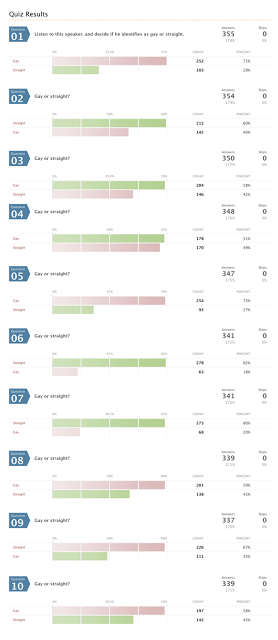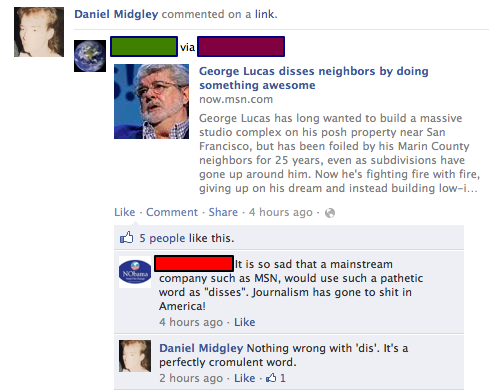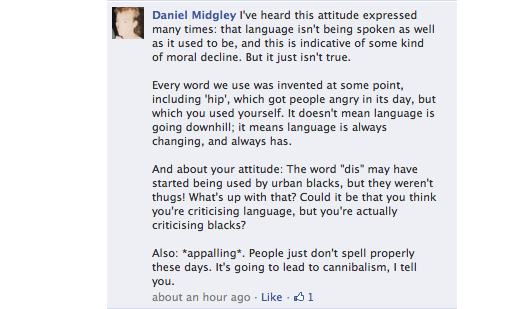There’s a new study that claims that people can detect gayface with 80% accuracy. But I’m not satisfied with it — when you dig down, the study really says that some people can get up to 80%, but everyone as a whole scores 57%, which starts to look a lot like random chance.
What about gayvoice? Lots of people are certain they’re gayvoyant, and they give a lot of plausible explanations for the voice — gay people use extra sibilance that serves as a socio-linguistic signal, and so forth — but I think that’s getting ahead of the game. Before we try to explain gayvoice, we have to make sure it’s real. As a starter, I’ve set up a quasi-scientific experiment.
The concept is simple. I’ve pulled twelve samples of male voices from episodes (chosen at random) of Dan Savage’s wonderful Savage Lovecast, where people call up and ask Dan for sex advice. The podcast is publicly available, so one presumes the guys in question consented to having their voices out there. Each of the guys identified as either gay or straight (but not bi or trans), and I’ve chosen a bit of their call that I think gives enough to get a feel for their voices, but not enough to give their orientation away.
Guess which guys are gay, and which are straight. You’ll see how well you did at the end of the test, and I’ll post the overall results in a couple of weeks.
<a href=”http://goodreason.polldaddy.com/s/gay-or-straight”>Click here to take the quiz.</a>
polldaddy.add( {
type: ‘button’,
title: ‘Click here to take the quiz.’,
style: ’rounded’,
text_color: ‘FFFFFF’,
back_color: ‘000000’,
domain: ‘goodreason.polldaddy.com/s/’,
id: ’16CC078F34156E61′
} );
Just one catch: At the moment, the poll does not work on Safari — it doesn’t let you see the audio clips. Apparently the new version of Safari has broken a few different poll sites. Use a different browser.
If you’re curious about gayvoice, people have studied this a bit.
- Benjamin Munson is on the forefront of the research [ 1 | 2 (pdf) ]
- Uncle Cecil of the Straight Dope has treated it.
- So has the Economist.
– – – – – – –
UPDATE
It’s been about a week, so I’ve put some results after the jump.
The way to read this chart: A green bar is the right answer, so when the green bar is on top, most people got it right.
The upshot: People picked gay voice correctly only half the time. Looks like random chance to me. You’d actually have done better if you’d assumed everyone was straight.
This doesn’t mean gayvoice isn’t real though. It just means these test-takers couldn’t tell from these samples. And there might have been a lot of confounding variables.
- The samples weren’t long enough, or of high enough quality.
- The speakers were listeners to the Savage Lovecast, and might have had more-gay friendly attitudes, which might have affected their speech patterns.
- This means they might have been more willing to accommodate to the person they were speaking to (viz, Dan, a gay guy).
- Talking about your own sexual problems might make you speak differently.
- Just because the general public can’t pick it doesn’t mean it’s not real. What about other gay guys? I didn’t do a breakdown that way, but it would be interesting.
Obviously, there are ways of speaking which are considered stereotypically gay, but from this test, they don’t seem to be reliably detected by most people. “More research is needed.™” Thanks to all to took the test.
Also, a shoutout to Polldaddy — there are lots of polling services, and I tried them all, but theirs was the easiest and most helpful, especially when embedding audio clips. Try them for all your polling needs.








Recent Comments